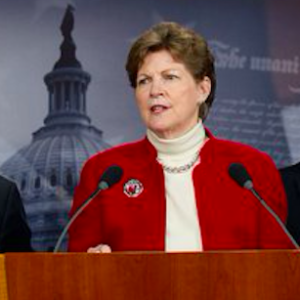If our New Hampshire delegation were serious about protecting Granite Staters from high energy costs, they wouldn’t just write letters to the Biden administration. They would take action on American energy policy.
Last month, Sens. Jeanne Shaheen and Maggie Hassan sent a letter to Secretary of Energy Jennifer Granholm asking for Biden to take actions including “releasing stock from the Northeast Home Heating Oil Reserve and other emergency authorities, to address acute supply shortages or reliability risks.”
What jumped out at me about their letter is what was not in it. All six New England governors also sent a letter to Biden, requesting he waive the arcane Jones Act. The exemption would have allowed New England to buy domestically produced liquefied natural gas (LNG) instead of relying almost exclusively on LNG from Trinidad and Tobago (T&T).
Let me be very clear: If there was an industrial accident or some other event that shut down the LNG facility at T&T, there would be blackouts in New England. T&T LNG is needed to keep the 1,400 MW Mystic generating facility running. (Mystic is now a Reliability-Must-Run facility) And we need their LNG to augment the supply we receive via pipelines when the weather is cold.
What the New Hampshire senators’ letter does say indicates they are either ignorant of the New England energy markets, or they think the people of New Hampshire are.
They suggest oil and natural gas prices are set by oil companies or utilities. These are market-based commodities whose price is set by global markets. Electric utilities’ default service rates in New England (except for Vermont) are set via competitive bid. They put out a load profile, review the various bids and select (subject to PUC review) the best one.
Individual consumers can go onto the competitive electric market and look for a better deal if they choose. For example, I’m paying $0.128/kwh vs. Eversources $0.226 /kwh. Whichever way you buy, the prices are not set by any one entity but by a large collection of market forces including a large risk premium based on supplying all the power customers need whenever they need it.
The letter is correct that natural gas prices are much higher in New England than other parts of the country. Again, this isn’t due to oil companies or utilities, but because of the actions of Democratic politicians.
We all saw political ads recently where the newly-elected Democratic governor of Massachusetts, Maura Healey, was bragging that she has stopped two natural gas pipelines from being built in New England. The lack of pipelines to supply natural gas to our region is the reason our prices are so much higher.
So, even if Biden and the rest of the Democrats canceled their war on fossil fuels tomorrow and allowed more domestic drilling for natural gas, without new pipelines New England would still have to pay higher prices. The Democrat-controlled Federal Energy Regulatory Commission (FERC) has recently proposed new rules that would make it even more time-consuming and expensive just to get a permit to build a pipeline — let alone build one.
No one is going to risk millions of dollars of their own money on fossil fuel projects as long as the Democrats are in charge.
We know our senators are good at spending other people’s money, but I doubt they would be willing to risk their own on a fossil fuel project.
They also praised the Inflation Reduction Act (IRA) as a way to reduce energy prices. In reality, the IRA needs to be put back in Fantasy Land where it belongs. We are never going to get the majority of our electricity from non-dispatchable sources like wind and solar. The problem is siting.
Everyone is in favor of building these projects — just not in their own backyard. Ask someone if they are in favor of solar and they say “yes.” Tell them it will require clear-cutting an area over 4 times the size of Pawtuckaway State Park and covering it with solar panels to replace one 600 MW natural gas generator, and they quickly change their mind.
As for offshore wind, it has two problems. First, offshore wind is in the same category as lobster fishing in the eyes of animal rights activists. It’s viewed as harmful to endangered whales and we have not built any yet.
The second problem with large-scale offshore wind is that it’s susceptible to a common mode failure. A major winter storm — a common occurrence here in New Hampshire — roars up the coast with 50-plus MPH winds offshore for several days. Using current technology, it’s likely the turbines will have to be shut down until the wind speeds drop. As this may not happen for days, and a single storm could affect most if not all the offshore wind, where will we get the tens of thousands of megawatts of electricity we’ll lose?
The answer is America’s natural gas reserves, the largest in the world. Natural gas is much cleaner than coal and oil. Ironically, the lack of natural gas resulted in New England getting 11 percent of its electricity from oil last January. And when we are short on natural gas this winter, we will once again burn more coal and oil.
We need to maximize our use of natural gas until advanced technologies such as small modular nuclear reactors and greatly improved electricity storage systems are developed.
The scheme our Democratic senators are pushing, building a massive renewable grid to meet the much greater demand for electricity from EVs, electric heat, etc. doesn’t even take into account the well more than 20,000 megawatts of dispatchable fossil fuel-generated electricity we’re using now.
They may be New Hampshire’s U.S. senators, but their energy policies are straight from Fantasyland.





